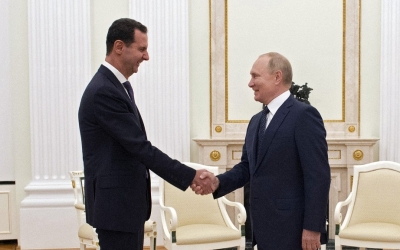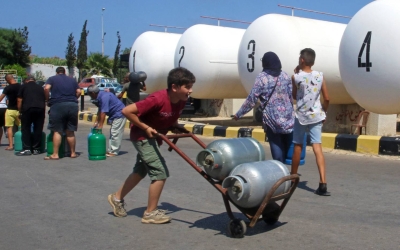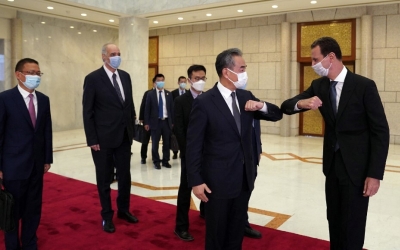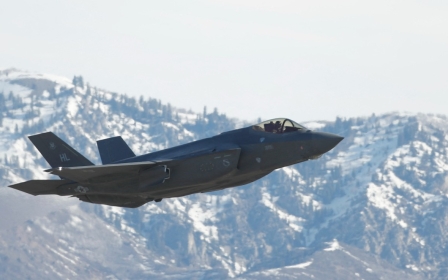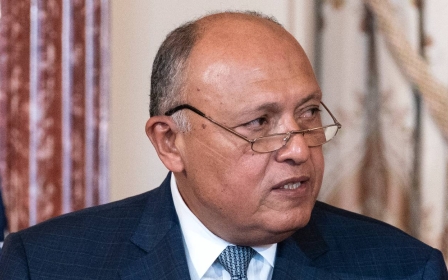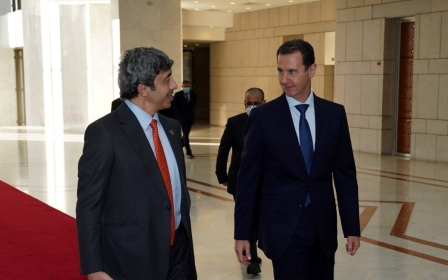UAE's embrace of Syria aims to weaken Iranian influence, experts say
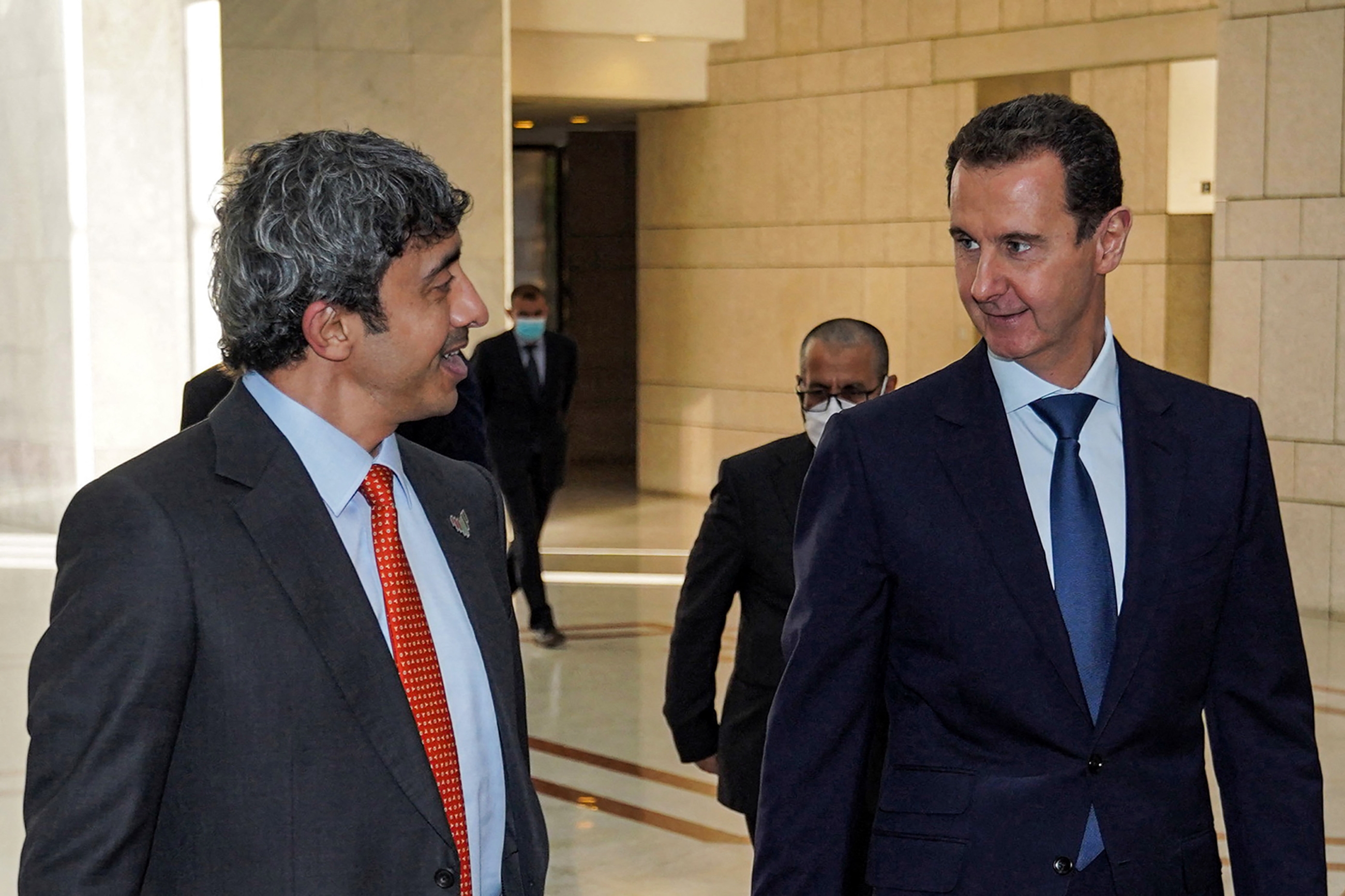
When it comes to the type of events that signal status for a leader in the Middle East, Syrian President Bashar al-Assad seems to be clawing his way back to the top.
This year alone, the Syrian leader has seen his country included in a pipeline deal backed by the US, dispatched his spy chief for a series of well-publicised security meetings with neighbouring states and held publicly announced phone calls with the king of Jordan.
The return of Syria into the Arab League, that creaky forum in which Damascus had long been a favourite habitué, is now being floated as a serious possibility.
The recent visit by the foreign minister of a wealthy Gulf sheikdom fits nicely when added to this mix.
Images from earlier this month showing Assad and the UAE's Foreign Minister Sheikh Abdullah bin Zayed meeting in Damascus were heralded by analysts as the latest proof that regional states are prepared to reengage with the Syrian government after years of isolation.
New MEE newsletter: Jerusalem Dispatch
Sign up to get the latest insights and analysis on Israel-Palestine, alongside Turkey Unpacked and other MEE newsletters
The outreach is being spearheaded by countries like the UAE and Jordan, and to a lesser extent Egypt.
While these countries have differing priorities, all of them are concerned about the position that rivals Iran and Turkey have been able to build up inside Syria as Arab influence has waned.
Kicking out the Iranians
While the pace and public nature of many Arab countries' diplomacy appear to be accelerating, analysts and officials in the region say it has been brewing for some time.
"The UAE has been doing this kind of outreach to Assad for two and a half years. So this latest visit is not that surprising," James Jeffrey, the Trump administration's former special envoy to Syria, told Middle East Eye.
In 2017, Bin Zayed warned against what he called the "colonial" actions of Turkey and Iran, both of which, while on opposing sides of the conflict, maintain proxies throughout Syria.
The UAE reopened its embassy in Damascus in 2018. That same year, Jordan appointed a chargé d'affaire to its embassy in Damascus after having recalled its ambassador in 2011 at the outbreak of the war.
"This has been in the works for a while now," a Senate staffer and former State Department official who recently met with US partners in the region told MEE on condition of anonymity.
Ties have been re-established slowly, with Emirati businessmen filtering back into Syria to attend trade fairs and direct flights between the two countries resuming earlier this summer.
Analysts say the UAE believes that by holding out to Syria the possibility of a return to the regional fold, they can limit the influence of rivals like Iran.
"They are trying to elicit promises and encourage the Assad regime in the hope it will reciprocate," said Jeffrey, who is considered by many to be a sceptic of engagement with Damascus. "Assad is not showing any flexibility on issues like the Iranians."
Natasha Hall, a senior fellow at the Center for Strategic and International Studies, echoed those sentiments as she questioned how far the Emirates will be able to go in making inroads with the Syrian government.
"Iran has an on the ground presence, militarily, economically, and increasingly within communities. For the past ten years, countries without a military presence in this conflict have little relevance to the chessboard," she told MEE.
While it is unlikely the UAE would send troops to Syria, the one thing it does have is cash, and Syria is in desperate need of economic assistance.
According to the World Bank, the country's economy has shrunk around 60 percent since the start of the conflict and the UN estimates it will cost around $250bn to rebuild Syria, a figure four times the size of its pre-war GDP.
So far, the only sign of investment from the UAE has been the creation of a 300-megawatt solar power plant in the Damascus countryside.
Neither the Syrian or Emirati governments have provided a start date for the project or disclosed which companies will undertake it.
According to Syrian state media, the solar power station will be constructed in two years and produce roughly 500 million kilowatt-hours of electricity, which is about six percent of the country's current production capacity.
Running on fumes
Syria's electricity woes are in many ways emblematic of the wider issues the country faces, and demonstrate how - in spite of the recent thawing of tensions with regional states - its isolation continues to plague the economy.
According to a 2021 report published by the European University Institute, Syria’s electricity output has plunged by roughly half since the start of the war, while per capita consumption of state produced electricity is just 15 percent of what it was in 2010.
The country experiences constant power outages and is reliant on allies like Iran to supply it with sanctioned oil and gas to run its power plants.
Karam Shaar, one of the authors of the report, told MEE that the UAE-financed solar plant will do little to address the root causes of Syria’s electricity shortages.
"The current problem is the unavailability of fuel and gas for existing power plants and the inability to repair transmission lines damaged by the war," he said, problems the report claims are based on the country's lack of credit and isolation from the global financial system.
For nearly a decade, the US and its western allies have waged an economic war on Syria, subjecting the country to crippling sanctions in the hope that it will lead to a political settlement.
In recent months the Biden administration has been accused by some of sending mixed signals regarding the implementation of Syrian sanctions, in part stemming from its support for a plan to pump Egyptian gas to Lebanon via the war-torn country.
"The administration has not always been consistent in its advice to Arab leaders on dealing with Syria," Jeffrey said before adding that the White House had been more explicit in condemning the recent visit of the Emirati foreign minister to the country.
State Department spokesperson Ned Price said at the time that the US was "concerned" about the meeting between the UAE's top diplomat and Assad.
"As we've said before, this administration will not express any support for efforts to normalize or to rehabilitate Bashar al-Assad who is a brutal dictator," he added.
However, when asked by MEE whether the Biden administration would seek to implement sanctions on Emirati firms that carry out the potential solar-plant project, a State Department spokesperson said that "while humanitarian assistance is exempted [from sanctions], many other investments in regime-held areas are not".
'Profoundly broken'
Some officials and analysts say it is wording like this that has opened space for a subtle shift in the region, giving US allies like the UAE the room to reach out to Damascus, even if on humanitarian grounds, as Washington maintains its policy of isolation.
"I do wonder if the Emiratis communicated with the US about this project beforehand," the Senate staffer said, adding that the project "straddles a fuzzy line between humanitarian work and stabilisation efforts".
The source said that based on their past conversations with State Department officials, they did not believe the administration will look to proactively sanction the project.
"I don't think we are going to see the application of more Caesar sanctions that would target US allies," the staffer added.
For the UAE, creating a small foothold in Syria and showcasing its willingness to stump some funds for the country via a benign-sounding solar project is likely based more on political considerations than economic calculations, analysts say.
Jihad Yazigi, the editor of the Syria Report, a business newsletter on the country, told MEE that he did not expect the UAE to put much money into Syria and called the solar project, "not very economically meaningful".
The UAE is not alone in its reluctance to invest in Syria; even Damascus's closest allies, namely Russia and Iran, which have been eager to grab stakes in small energy projects and take control of key infrastructure, are hesitant to commit.
For analysts, part of the reason is that Syria - which continues to face security threats, western sanctions and massive corruption - simply remains an unattractive destination for investment.
"The Syrian economy is profoundly broken," Yazigi said.
Shaar, who is sceptical that the solar plant will be completed, said the UAE's interest in the project was "more political" than anything else.
The return on investment the country sees will likely be measured by whether it is successful in checking Iran’s growing influence in the war-ravaged state and altering the Assad government’s behaviour.
In the near future at least, it is likely to continue facing sceptics in the West, like Hall. "It is completely unclear to me… what the UAE has received from the regime for putting itself out on this political and economic limb."
Middle East Eye delivers independent and unrivalled coverage and analysis of the Middle East, North Africa and beyond. To learn more about republishing this content and the associated fees, please fill out this form. More about MEE can be found here.


